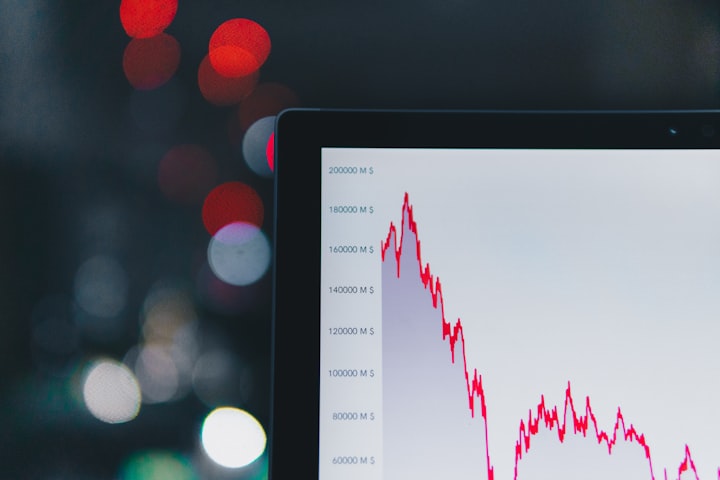I've always felt I had a lot to say. That the best way for me to express myself was in writing. I've written a lot in my life. On corners of tables, on my iPhone notes, on Words...
But I've never used them. I've never shared them. I've always said to myself: will it be fun to read me? Do I have the talent to be read?
Anyway, all that to say that, on the occasion of this first story on this platform - the first platform where I publish my writings - I'd like to introduce myself briefly before getting to the heart of the matter.
My name is Guillaume, I'm French and I work in finance. My entire career has been built around finance, first market finance, then corporate finance. This has led me to work today in one of the country's largest companies, as head of a finance unit. And before that, I was lucky enough to spend some time in asset management. All this to say that on both sides of the fence, I've been involved in investments. Admittedly, not always the same ones, but I'm supposed to know about them.
I'm probably familiar with the vast majority of existing asset classes and financial instruments. Some I know very well, others I'm just familiar with, without being an expert; but let's just say that I'm confident to claim I understand every investment I came across thanks to my background and experience.
Calls and puts were part of my university curriculum. I learned how to price them, understand the variables; in short, how to do option pricing. It wasn't sexy, especially as I progressed through school and realized more and more that I was going into corporate finance.
Years passed between my courses and my working life. I was lucky enough to be able to put money aside from time to time, while paying off my debts, and naturally, I sought to invest intelligently on the basis of my academic achievements, always looking to optimize the risk/return ratio. Despite the various setbacks - COVID, war in Ukraine, inflation, etc. - which led me to see very little change in my investments, I persisted in finding new solutions.
In July this year, I decided to start trading options. We're talking about the riskiest financial instruments I've ever touched. I consciously accepted extreme risk-taking this time. It was deliberate. To take an even greater risk, I decided to buy options with a very short maturity: one week. At this point, I should point out the specificity of options. Unlike equities, which are often the underlying asset, they have an expiry date. For the uninitiated, it's a question of betting up or down, based on an expected price, at an expected date.
Netflix and Tesla's quarterly results were due this week. On Sunday evening, I form a conviction about their announcements. And I accept the idea that I could lose it all in a matter of days. I decide to put down a small sum, but one that still means a lot to me: €600, split between the two companies... upwards. They announce Wednesday evening, when the markets close.
Monday and Tuesday go superbly well: I'm up €1,200. At this point, I'm thinking that I've made a good bet - to be completely honest, I'm quickly realizing that perhaps I'm more of a financial genius than I'd previously thought. I find it indecent, thinking "what's the point of working if I can earn €1,200 in just two days? That's a monthly salary in many countries - and almost the minimum in mine. I refuse to sell, however, convincing myself that "I'm right, the results will be good, I can go and get even more!". Grave mistake.
Wednesday arrives. The markets fall slightly, awaiting the results. They close. The results are announced.
The results were not good. I lost everything overnight.
600€... and a first lesson: don't be too greedy. It sounds obvious, but in such a situation, it was difficult. My first time with options and an immediate success situation impacted my ego and blinded my judgment.
Of course, I went back to it all summer, with various underlyings, but mainly NASDAQ companies, or the NASDAQ-100 index directly. Some successes, many difficulties, leading to a result of... 0. No losses, but no gains either. Until September.
Regularly, the Fed makes announcements, and indicates its monetary policy. The idea here is not to explain all the implications - perhaps in a future note, but there are plenty of online resources on that already. But as such, Jerome Powell is giving a speech. The date was marked for September, as usual. Observing a shallow downtrend, I was heavily invested in call options (i.e., betting on the upside) on the major US technology companies.
Powell gave his speech - unconvincing, unreassuring, implying that high financing rates would remain stable or even rise. That's all it takes for the markets to reposition their valuation expectations to the downside. My options are taking a hit. But I don't believe in a sharp decline. I'm gradually reinvesting what cash I have left. The same day. The next day. The day after that... until I'm nearly €8,000 in the red.
I wait for a rebound, observe the market with a magnifying glass. With nothing to show for it, I agreed to sell for a loss of €6,000. We'll see where the markets go from here, but the maturity of my options didn't allow me to keep believing for long...
I had always read that options were extremely risky and that only a minority of investors managed to make money with their use. I believed I was in that minority, thanks to my background. And now I feel like saying that, despite my background, I'm in the majority.
And I know that my mistakes depend on simple yet complex factors: ego, greed, overconfidence...
This is an enormous sum for me. Of course, I'm sorry I ever got into this in the first place. But since I refuse to come away from this without something positive, here are the lessons I've learned:
(i) Whatever you do in life, find out the consequences of your decision. Weigh the pros and cons, really and succinctly assess all the risks. Don't go for it unless it's worth it,
(ii) Remain humble, even if you think you know your subject and understand its ins and outs. Whatever the situation, there's always a large element of the unknown, of randomness or uncontrolled variables: take into consideration that things may not go according to plan, so you can better anticipate scenarios. Don't take anything for granted,
(iii) See the positive in adversity. Like everyone else, I've lived through some very difficult times in my life, whether the root causes were friendly, family or professional; but anything to do with money is very difficult too, especially when you're talking about a big loss with no tangible counterpart. As with my other difficult experiences, I try to tell myself that I'll come out of it stronger, both if I want to get into trading again later and for the overall education it's given me and the psychological work I've done.
I don't think that at this stage, I have anything to teach experienced traders. In fact, I think it's the other way round, and that I have a lot to learn from others. How do you manage your emotions when trading? How do you manage your ego in different personal and professional situations?
If you've made it this far, thank you very much for reading. :)
If you've enjoyed this story, let me know. Create engagement on this post. I'd love to keep writing!






Comments
There are no comments for this story
Be the first to respond and start the conversation.